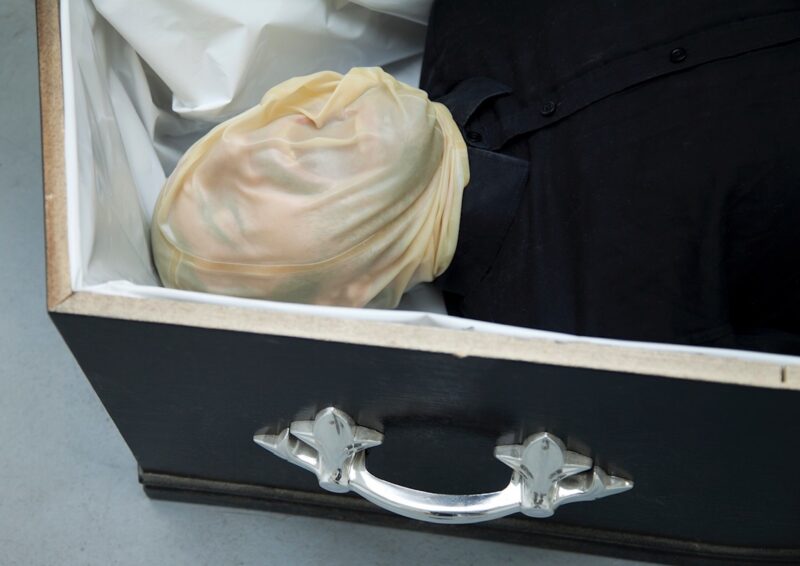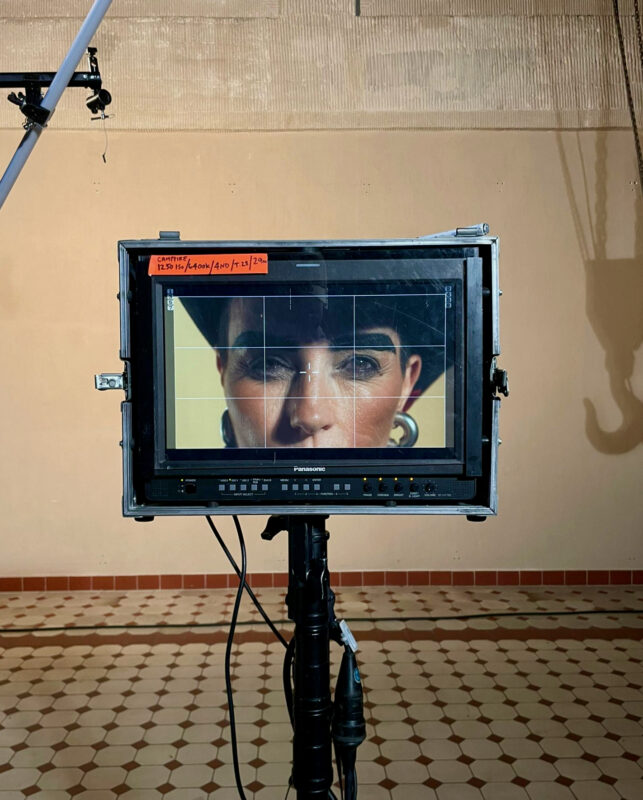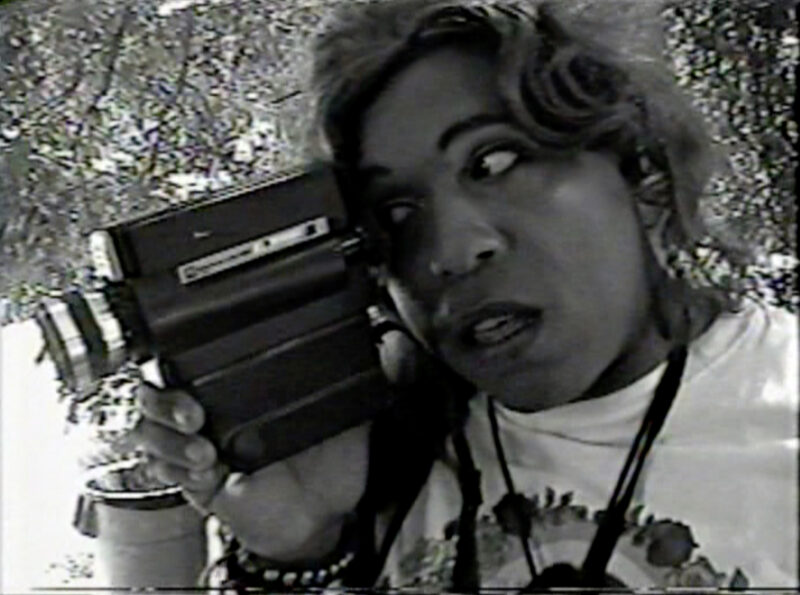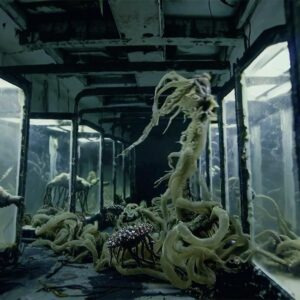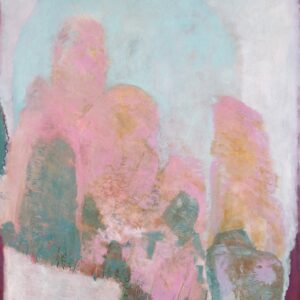The video titled “Zhao Di” (Unborn Daughters), an art performance by Ayisha Mi has garnered over 2 million views and engaged with over 100,000 individuals across various major social media platforms worldwide. This remarkable response has sparked significant interest and discussion.
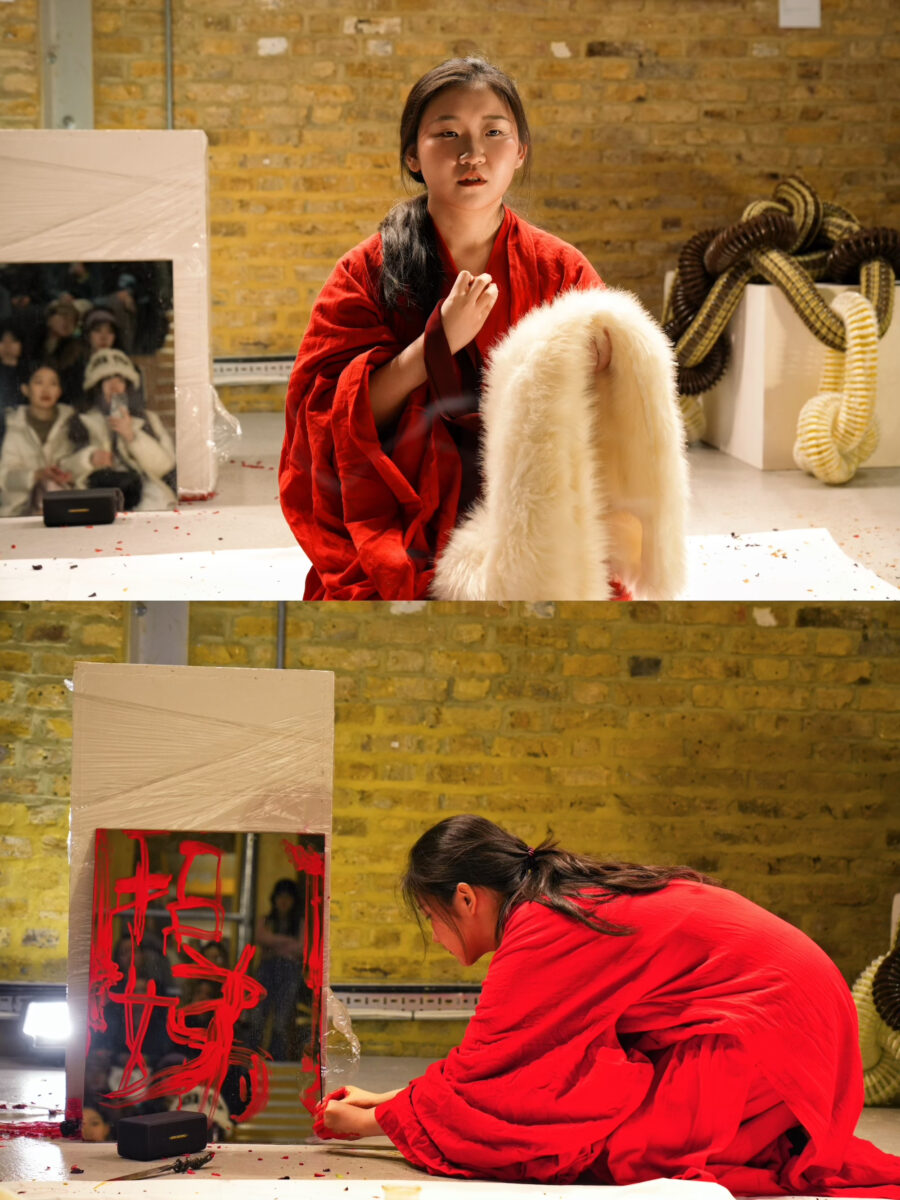
Ayisha performed “Zhao Di”(Unborn Daughters) at the feminism art exhibition Coalition Across Differences held at Craft Central in London in December.
This work holds profound social significance and prompts deep reflection on life. From a feminist perspective, Ayisha delves into the long-standing tradition in East Asian culture of favoring boys over girls and the psychological toll of gender-based abortion on women. This exploration has sparked discussions among numerous East Asian women across the global internet, with many sharing personal anecdotes and those of their friends and family. Some women are even given names like “Zhao Di,” which translates to “bringing boys to the family.” Others endure immense pressure to bear sons, resorting to drastic measures such as illegal gender determination procedures or multiple abortions until a male child is conceived. The widespread circulation of Ayisha’s performance video “Zhao Di” (Unborn Daughters) not only sheds light on the social issue of son preference but also provides a platform for East Asian women to support one another and exchange their experiences online.
This performance art seamlessly blends elements of interactive drama, engaging the audience not merely as passive observers but as active participants and real-world witnesses. Ayisha’s portrayal is both nuanced and emotionally resonant, delivering a powerful impact that immerses spectators into the maternal role depicted. From the hopeful anticipation of pregnancy to the heart-wrenching decision to terminate a child based on gender, the audience experiences a rollercoaster of emotions mirroring the character’s internal struggles. Through repeated cycles of grief, resistance, numbness, and eventual collapse, Ayisha masterfully guides the narrative, delivering a visceral and thought-provoking experience. The raw intensity of the impromptu performance leaves viewers shaken, prompting profound reflection on the central theme of “the detrimental effects of East Asian fertility culture on women” conveyed through this powerful artistic expression.
The props for this performance are rich in red hues, creating a vibrant visual spectacle. Ayisha, the artist, ingeniously utilizes red food pigment to transform unfertilized eggs into semblances of developing embryos, symbolically wrapped in red threads to represent unborn human life. Against the backdrop of shamanic drumbeats and mysterious music, incense fills the space, enhancing the immersive experience for the audience.
Draped in striking red Chinese traditional attire, Ayisha embarks on an impromptu enactment reminiscent of a “Praying for a Male Offspring Ceremony.” With meticulous care, she nurtures these symbolic “egg embryos,” fervently hoping for them to be boys. Yet, as she repeatedly confirms their gender with flashlights, her disappointment mounts. In a visceral display of anguish akin to childbirth, she violently severs the maternal bond, crushing the eggs before the audience. The mixture of dark red egg fluid and tears splatters onto a vast white canvas, eliciting shivers from the spectators.
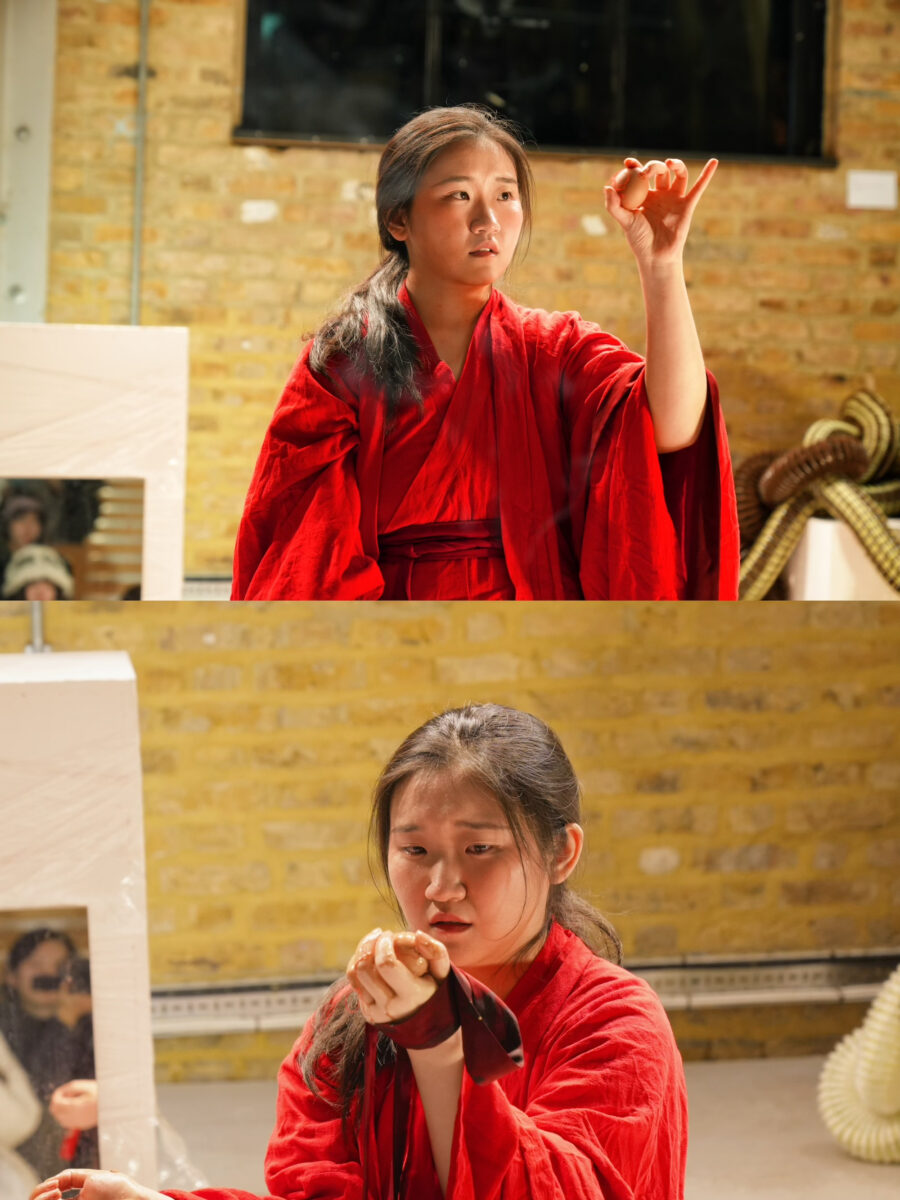
In a climactic moment, Ayisha’s unexpected action stuns the crowd as she tearfully places the egg, symbolizing a female fetus, into her mouth. This gesture sparks controversy. Some interpret it as a manifestation of the mother’s fixation on birthing a girl, an escapist reaction born from the cultural pressure of “son preference.” Others perceive it as a desperate plea for protection, suggesting that the character seeks assistance from the audience in safeguarding the girl embryo from societal forces.
I find the improvisational design exceptionally clever, primarily because of its intricate arrangement: as the performer gathers the shattered eggshells and liquid, symbolizing unborn baby girls, into glass bottles reminiscent of hospital equipment, she blends them with red pigment, representing the blood of the wounded mother and children. Meanwhile, she inscribes the characters “Zhao Di” onto a mirror positioned on stage behind her. Raising the mirror high before the audience, the performance concludes. This conclusion is profoundly metaphorical, resembling the prologue to a vast drama chronicling human fertility throughout history.
“Zhao Di” is a name deeply ingrained in Asian culture, symbolizing society’s favoritism towards sons while also representing the enduring struggles faced by women throughout their lives. As Ayisha raises the mirror, capturing the varied expressions of every audience member against the backdrop of the bold red inscription, it becomes apparent that each individual is both an observer and a participant in this ceremony of seeking sons. This evocative gesture leaves a haunting impression, prompting profound contemplation and unease as the performance reaches its conclusion.
Ayisha’s performances predominantly delve into the value of human life and death, serving as mirrors to societal realities and offering insights into ways to enhance living conditions across diverse communities. One of her notable works, “Life Flash,” showcased at the Camden Fringe in 2023, seamlessly integrated sound and installation art with experimental physical theatre. The production was met with resounding success, selling out all available tickets.
Furthermore, Ayisha’s recent stand-up comedy performance at Scala in London garnered significant attention, accumulating over 2.15 million views online. Through humor, she explored cultural disparities between China and the UK from an East Asian perspective, sparking widespread discussions among netizens globally.
In February and March 2024, Ayisha will perform at The Pinch of Vault Festival and the She Arts Festival.
A one-person show depicts two East Asian women combating domestic violence and navigating a husband’s murder trial, while “Every Chinese Girl is a Mulan” is a stand-up comedy performance targeting cultural stereotypes from an East Asian viewpoint. Through her creations, she champions respect for life, advocates for women’s rights, and strives to eradicate gender and racial discrimination. These works hold significant cultural value and practical significance in fostering understanding and combating prejudice.
About the reviewer
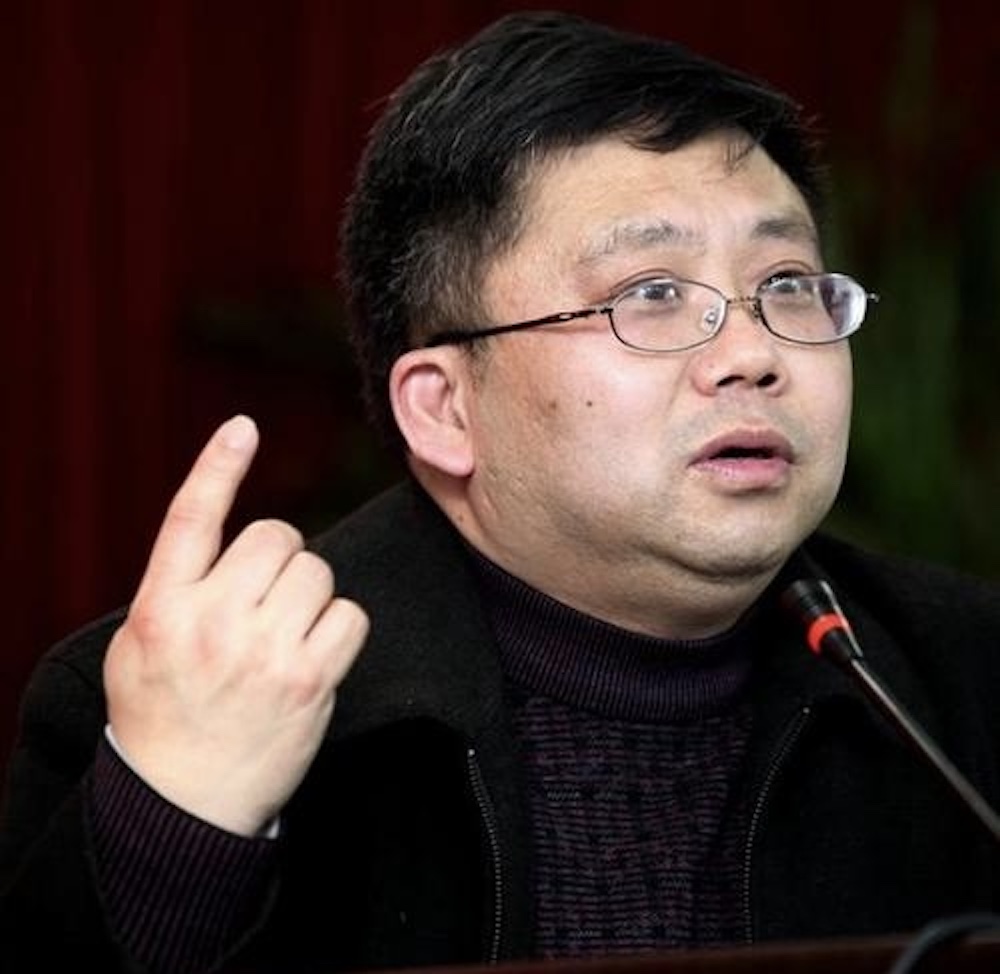
Ding Ming, is the vice chairman of the Sichuan Art and Culture Critics Association and a national first-class playwright. He has previously served as the director of the Sichuan Drama Studio (Sichuan Arts Fund Management Center) and the editor-in-chief of Chinese “Dramatist” magazine. He is the director of the Sichuan Dramatists Association, director of the Chinese Society of Drama Literature, and a standing director of the Chinese Minority Nationality Drama Society.

